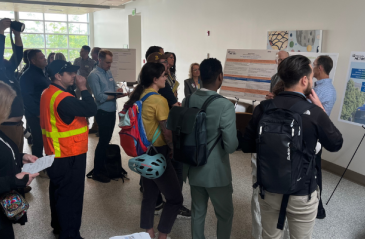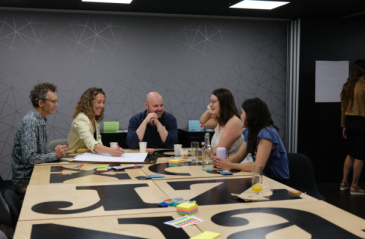
The information barriers holding back climate action and how to break them

The more people with more perspectives and more information the better
Share articleSpeed, believes @dgardner, is an invidious force that works against good decisions
Share articleSocial media has limited value in terms of decision-making, says @dgardner
Share articleWe put our vision for government into practice through learning partner projects that align with our values and help reimagine government so that it works for everyone.
Looking to the future. As clichés go it's well worn, but for Dan Gardner the phrase runs deep, underpinning much of his professional life and influencing his core insights on how people can make wiser choices.
The author of three bestsellers on forecasting, risk and decision-making, he can often be found in the lecture hall or hunched over his laptop, tapping out a new article or working on his latest book (on the challenge of long-term planning in a short-term world). The consulting track has also beckoned - clients interested in how to improve decision-making and implementation include Justin Trudeau, Canada's prime minister.
“What works? What makes a good decision? That's all I care about,” says Gardner. “But here's the curious thing. What we know from theory and from experiment and experience is that diversity works. When you get more people with more perspectives and more information together then that's good for decision-making. It is also good in that we are reaching out to distil others' judgement. It makes for better decisions and is also good for citizenship.”
Prior to becoming an author, Gardner was a newspaper columnist and feature writer - a role he took up after serving in Ontario as senior policy adviser to the minister of education and social policy adviser to the premier. This period offered his introduction to the world of government and the decisions that are made behind closed doors and away from the cameras. He soon found that speed kills.
“Any decision-maker will tell you they need to take time to make good decisions about complex issues,” he says. “But way too often, governments get criticised for ‘delaying' decisions. This has been an eternal problem - it's not something new.”
To illustrate his point, he cites the experience of Robert McNamara, US defense secretary under presidents Kennedy and Johnson - Gardner's books are peppered with historical examples like this. A much vaunted member of the “best and brightest”, he had previously served as president of the Ford Motor Company and was much admired for the company's success on his watch. His stellar academic and business credentials were not, however, sufficient to steer him away from the decision to escalate in Vietnam.
“The decision was based on the domino theory,” explains Gardner, “which they never did actually test and was effectively a forecast. When McNamara wrote his autobiography, he looked back and asked why they blew it so badly and said that the rush of daily events prevented them from testing their assumptions. Remember, this was 1962, even before the impact of information technology (IT) had truly been felt. The one thing where you can say that IT and digital technology have absolutely changed governance and politics profoundly is speed - and this is so unfortunate.”
Speed, believes Gardner, is an invidious force that works against good decisions being taken. “It is just the wrong way to do it,” he says. “Everything we know about organisational theory confirms this, and everything we know about psychology confirms this. So politicians have to learn to push back against it.”
This is not always straightforward. After all, politicians have emerged from political campaigns where rapid rebuttal has emerged as a key tactic, but Gardner insists that, once in office, it is better to take stock rather than rush to judgement. “OK, very often they will have to respond to what is happening on social media,” he says. “But they shouldn't be bullied into a position; they have to make a virtue of saying ‘I don't know, I have to think about it'.”
In addition to speed, Gardner also expresses his frustration that many governments - particularly in his home country of Canada - have yet to fully embrace the potential for digital technology to improve governance and decision-making.
“The lack of progress is really remarkable when you consider how much has changed - it's almost hard to exaggerate the extent to which IT has changed how we live,” he observes. “The ability that we have now to do incredibly important work and our ability to aggregate - which is crucial to good decision-making - have been utterly revolutionised. But then when I look at the federal government in Canada and when I look at other large hierarchical institutions, I see the 1960s.”
Partly this is down to the often overwhelming volume of data and information that is now out there. Take social media, for example. How can politicians and policymakers discern the pertinent insights amidst the tidal wave of tweets and Facebook posts that are sent out every minute of every day? Gardner says that it's often not worth the trouble.
“Social media is indisputably a terrific marketing vehicle and there are lots of folks in politics doing it very well,” he admits. “But what is the value of it in terms of decision-making inputs? You get a barrage of noise from social media and it's extremely difficult to try and distil something out of that - it's like learning how to take a sip from a fire hose. The aggregation that I would be looking for is something quite different, and it isn't happening as far as I can work out.”
That said, Gardner also stresses that governments clearly desire to raise their game and adds that it is one of the few issues that unites politicians from different partisan backgrounds. “The sincerity is there and the desire is there,” he says. “But even though there is the recognition that this amazing information revolution really should be changing how we do things, the problem is we're not exploring the techniques that can help us get there.”
Often, system-wide inertia can prevent change from taking place. “For example, government doesn't like experimentation - experiment means trying something and it might fail,” he points out. “Whereas in Silicon Valley they sit around and brag about their failures - government is the polar opposite. In political communication, you often hear the word ‘risky' before ‘experiment' as a reason not to try anything, because politicians always need to know what the answer is. Similarly, in governments and politics, information is still treated as a valuable resource to be hoarded - there is a huge culture shift that needs to take place.”
Gardner, however, remains an optimist that things can and will change for the better. “People can learn this stuff,” he concludes. “It's only a matter of time, but we'll get there and the positive impact will be clear for all to see.”











